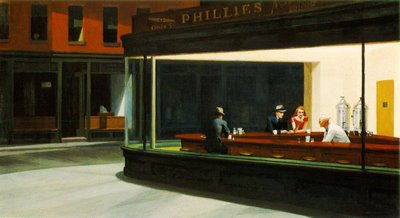 Pierre-Auguste Renoir, Luncheon of the Boating Party
Pierre-Auguste Renoir, Luncheon of the Boating Party(October 26) I really liked Three Men in a Boat – it’s the buddy movie of its day – the Seinfeld or Mary Tyler Moore Show of the 1880s. It’s very funny. The story is nominally about one trip up the Thames in a rowboat undertaken by three young urban professionals, but this particular trip is really just the backdrop for a series of comic monologues about other boat trips and adventures and about life in general, à la George Carlin or Dave Barry. As the friends get ready for the excursion, for example, J., the narrator, pauses to lampoon weather forecasting and barometers: Then there are those new style of barometers, the long straight ones. I never can make head or tail of those. There is one side for 10 a.m. yesterday, and one side for 10 a.m. to-day; but you can't always get there as early as ten, you know. It rises or falls for rain and fine, with much or less wind, and one end is "Nly" and the other "Ely" (what's Ely got to do with it?), and if you tap it, it doesn't tell you anything. And you've got to correct it to sea-level, and reduce it to Fahrenheit, and even then I don't know the answer. The book is fun also because of the sensation of travelling back in time 120 years – paid work is done by children, people move their bathtubs around, a complete supper can be bacon and a jam tart, young men share single beds matter-of-factly. Spookily at one point, J. reverses the time-travel effect by making fun of the fashion of collecting antique china: Will the prized treasures of to-day always be the cheap trifles of the day before? Will rows of our willow-pattern dinner-plates be ranged above the chimneypieces of the great in the years 2000 and odd? Well, yes, they will! It was surprising that interspersed among the funny anecdotes and clever observations are serious little flights of poetic fancy that occasionally verge on the mawkish. I was struck by this one, though: And yet it seems so full of comfort and of strength, the night. In its great presence, our small sorrows creep away, ashamed. The day has been so full of fret and care, and our hearts have been so full of evil and of bitter thoughts, and the world has seemed so hard and wrong to us. Then Night, like some great loving mother, gently lays her hand upon our fevered head, and turns our little tear-stained faces up to hers, and smiles; and, though she does not speak, we know what she would say, and lay our hot flushed cheek against her bosom, and the pain is gone.
